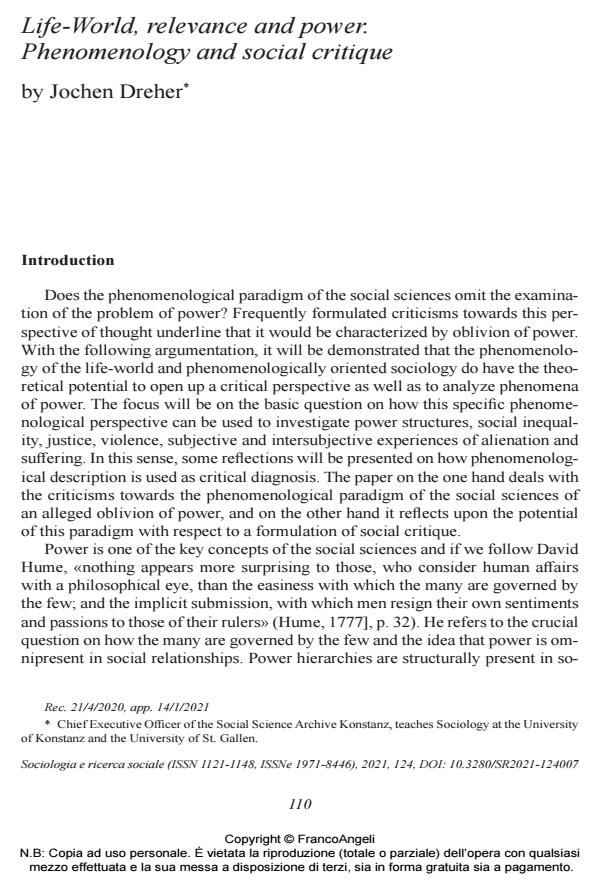Life-World, relevance and power. Phenomenology and social critique
Titolo Rivista SOCIOLOGIA E RICERCA SOCIALE
Autori/Curatori Jochen Dreher
Anno di pubblicazione 2021 Fascicolo 2021/124 Lingua Inglese
Numero pagine 13 P. 110-122 Dimensione file 170 KB
DOI 10.3280/SR2021-124007
Il DOI è il codice a barre della proprietà intellettuale: per saperne di più
clicca qui
Qui sotto puoi vedere in anteprima la prima pagina di questo articolo.
Se questo articolo ti interessa, lo puoi acquistare (e scaricare in formato pdf) seguendo le facili indicazioni per acquistare il download credit. Acquista Download Credits per scaricare questo Articolo in formato PDF

FrancoAngeli è membro della Publishers International Linking Association, Inc (PILA)associazione indipendente e non profit per facilitare (attraverso i servizi tecnologici implementati da CrossRef.org) l’accesso degli studiosi ai contenuti digitali nelle pubblicazioni professionali e scientifiche
Does the phenomenological paradigm omit the examination of the problem of power? Frequently formulated criticisms of phenomenological thought underline that it would be characterized by oblivion of power. The following line of argument will demonstrate that phenomenology and phenomenologically oriented sociology do have the theoretical potential to open up a critical perspective as well as to analyze phenomena of power. The focus will be on the basic question on how the phenomenological perspective can be used to investigate power structures, social inequality, justice, violence, subjective and intersubjective experiences of alienation and suffering. In this sense some reflections will be presented on how phenomenological description is used as critical diagnosis. The paper deals on the one hand with criticism of the phenomenological paradigm of an alleged oblivion of power, and on the other hand it reflects upon the this paradigm’spotential of with respect to a formulation of social critique.
- P.L. Berger, T. Luckmann (1966), The Social Construction of Reality. A Treatise in the Sociology of Knowledge, New York, Anchor Books, 1989.
- P. Bourdieu (1992), On Symbolic Power in Language and Symbolic Power, ed. by John B. Thompson, Cambridge, Polity Press.
- J. Dreher (2016), «The Social Construction of Power: Reflections Beyond Berger/Luckmann and Bourdieu», Cultural Sociology, 10, 1, pp. 53-68.
- J. Dreher, D. López (2015), «Subjectivity and Power», Human Studies, 38, pp. 197-222.
- M. Endreß (2005), Reflexivity, Reality, and Relationality. The Inadequacy of Bourdieu’s Critique of the Phenomenological Tradition in Sociology, in M. Endreß, G. Psathas, H. Nasu
- (eds.), Explorations of the Life-World: Continuing Dialogues with Alfred Schutz, Dordrecht, Springer.
- J. Habermas (1987), The Theory of Communicative Action Vol. 2: Lifeworld and System: A Critique of Functionalist Reason, Boston, Beacon Press.
- D. Hume (1777), Of the First Principles of Government, in Essays Moral, Political, and Literary, ed. by E.F. Miller, T. Hill Green, T. Hodge Grose, Indianapolis, Liberty Fund, 1987.
- H. Nasu (2008), «A Continuing Dialogue with Alfred Schutz», Human Studies, 31, 2, pp. 87-105.
- H. Popitz (2017), Phenomena of Power. Authority, Domination and Violence, transl. by G. Poggi,
- ed. by A. Göttlich, J. Dreher, New York, Columbia University Press.
- A. Schutz (1953), Common-Sense and Scientific Interpretation of the Social World, in Collected Papers I: The Problem of Social Reality, ed. by M. Natanson, Den Haag, Martinus Njihoff, 1962.
- A. Schutz (1946), The Well-Informed Citizen: An Essay on the Social Distribution of Knowledge, in Collected Papers II: Studies in Social Theory, ed. by A. Brodersen, Den Haag, Martinus Njihoff, 1964.
- A. Schutz (1970), Reflections on the Problem of Relevance, New Haven, Yale University Press.
- A. Schutz, T. Luckmann (1973), The Structures of the Life-World, vol. 1, London, Heinemann.
- I. Srubar (2005), The Pragmatic Theory of the Life-World as a Basis for Intercultural Comparisons, in M. Endreß, G. Psathas, H. Nasu (eds.), Explorations of the Life-World. Continuing Dialogues with Alfred Schutz, Dordrecht, Springer.
- I. Srubar (2007), Ist die Lebenswelt ein harmloser Ort? Zur Genese und Bedeutung des Lebensweltbegriffs, in I. Srubar (ed.), Phänomenologie und soziologische Theorie. Aufsätze zur pragmatischen Lebenwelttheorie, Wiesbaden, VS-Verlag.
- T. William Issac, D. Sweine Thomas (1928), The Methodology of Behavior Study, in The Child in America: Behavior Problems and Programs, New York, Alfred A. Knopf.
- M. Weber (1920/21), Economy and Society. An Outline of Interpretive Sociology, Berkeley, Los Angeles, London, University of California Press, 1978.
- Esquisse d’une théorie schützienne des émotions Giulia Salzano, in Sociétés /2023 pp.59
DOI: 10.3917/soc.160.0059
Jochen Dreher, Life-World, relevance and power. Phenomenology and social critique in "SOCIOLOGIA E RICERCA SOCIALE " 124/2021, pp 110-122, DOI: 10.3280/SR2021-124007